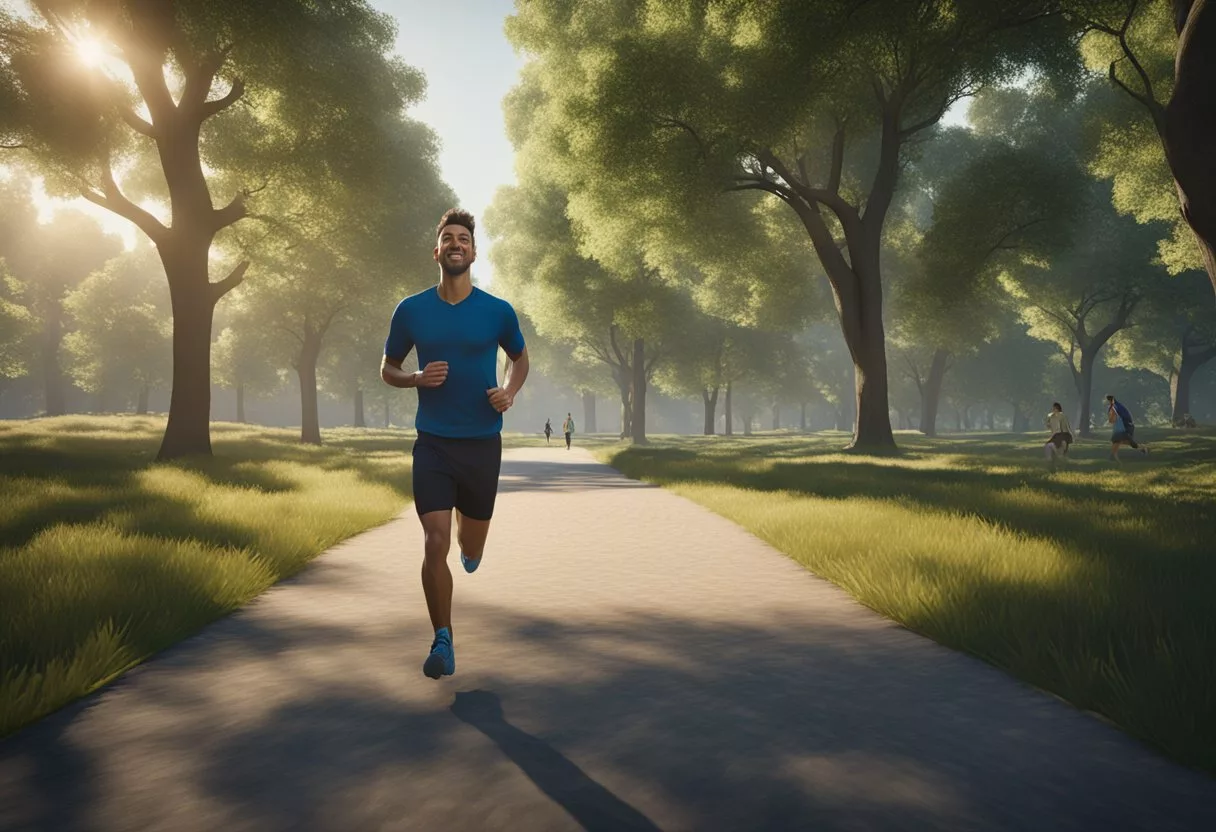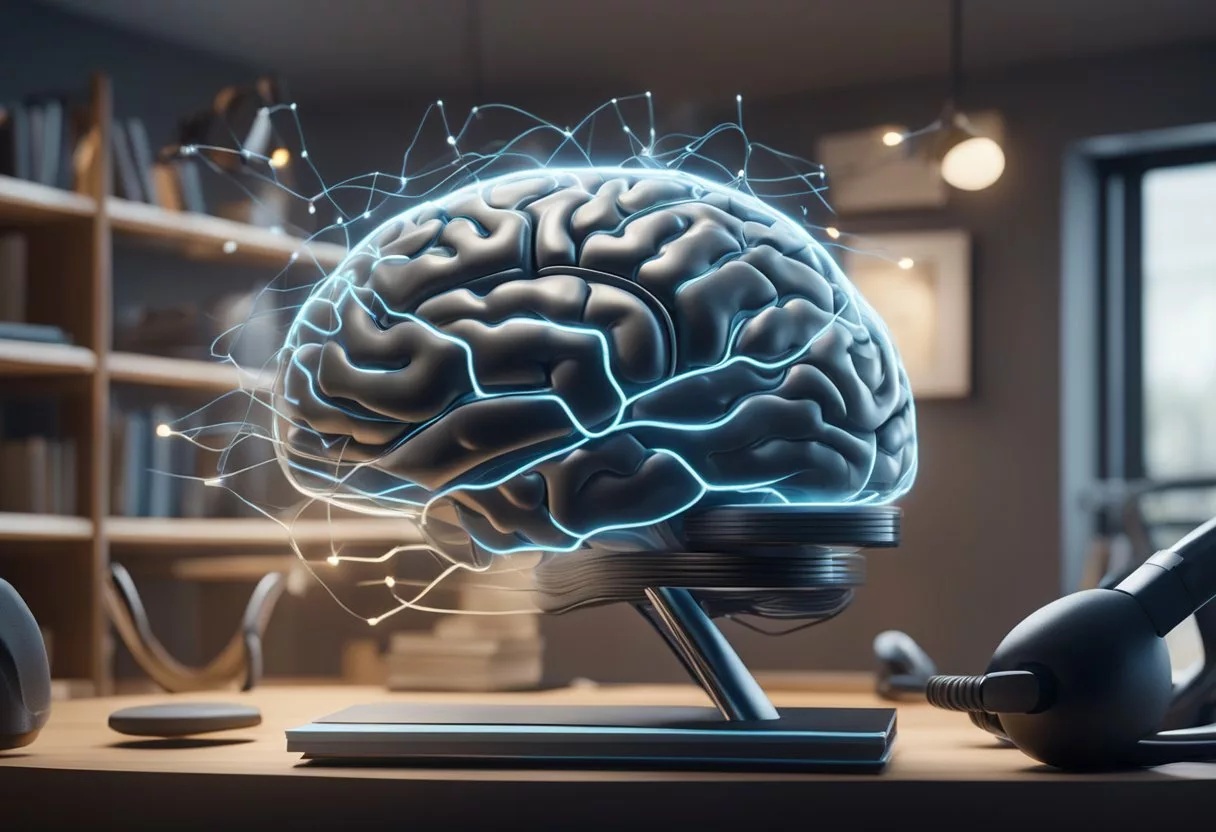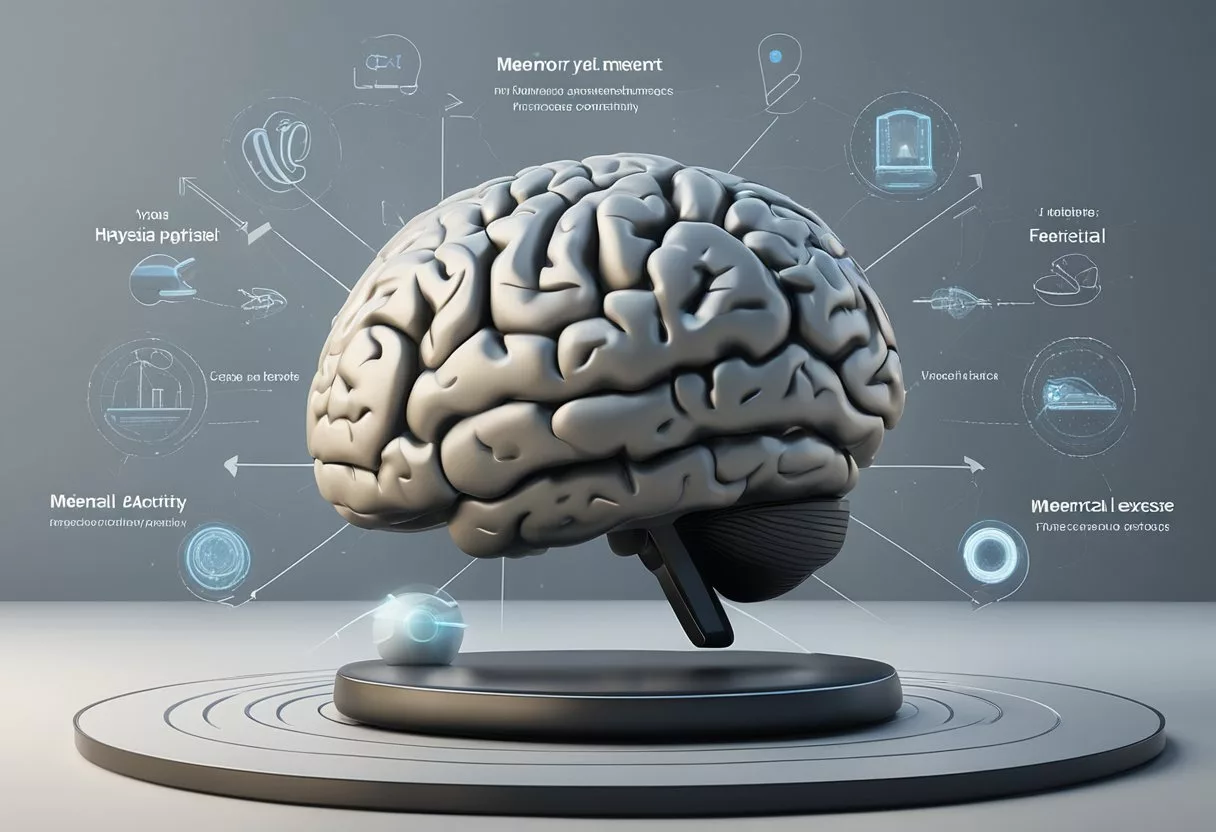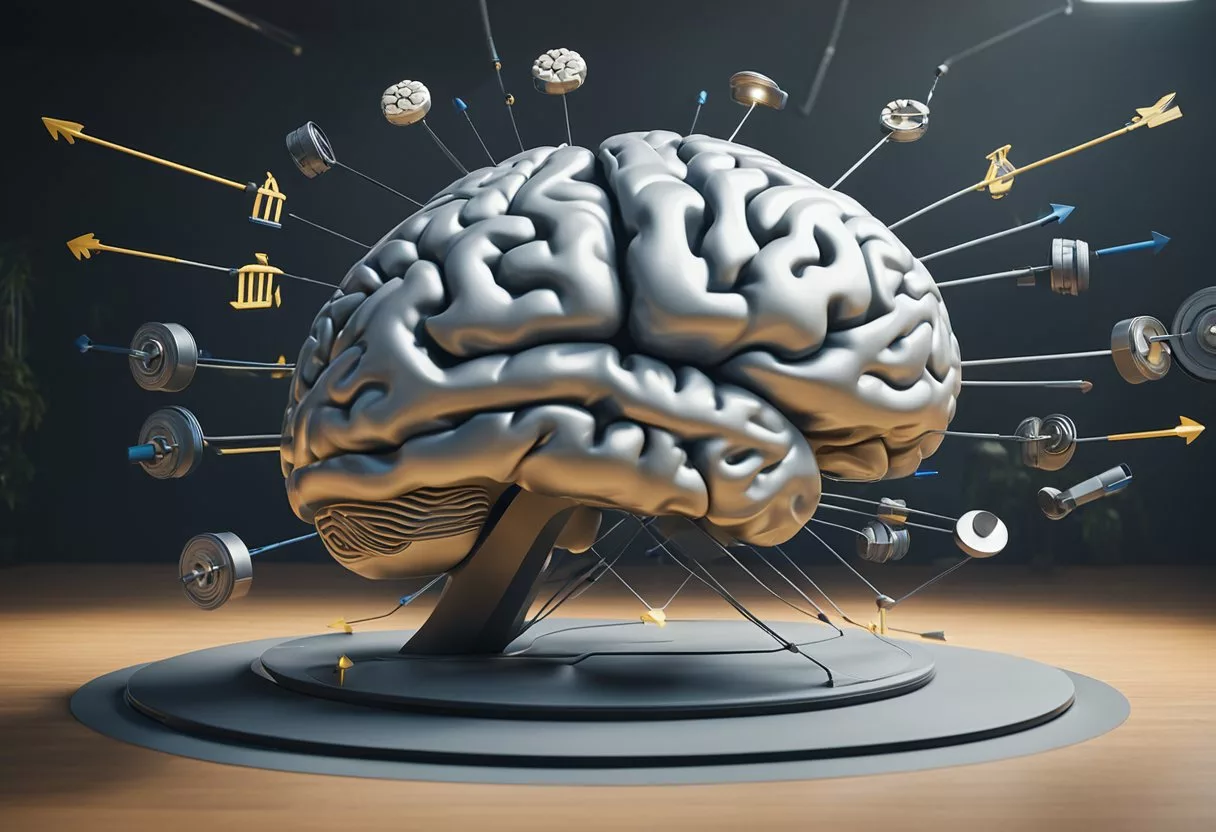The relationship between physical activity and memory function is a growing area of interest within the field of cognitive neuroscience.
Scientific research suggests that exercise may have a profound impact on the brain’s ability to remember and process information.
These findings are particularly relevant given the increasing prevalence of sedentary lifestyles and the global rise in age-related cognitive decline.
To understand the potential benefits of physical activity on memory, it is vital to examine the mechanisms at play and the types of exercises that could foster optimal cognitive function.

The impact of exercise on cognitive health extends beyond memory; it also includes broader effects on mental well-being and brain neurochemistry.
Regular participation in physical activity is correlated with an enhancement in memory functions, which is believed to be mediated through various physiological changes, such as increased blood flow to the brain and the release of neurotrophic factors.
Furthermore, incorporating exercise into one’s lifestyle can contribute to improved educational and academic outcomes and offers an accessible strategy for enhancing cognitive health across the lifespan.
Key Takeaways
- Regular exercise is linked to enhanced memory functions and overall cognitive health.
- Physical activity influences brain structure and neurochemistry beneficial for memory.
- Integrating physical activity into daily life can improve educational and academic performance.
The Science of Physical Activity and Memory

Physical activity has a measurable impact on the brain’s structure and function, particularly concerning memory and cognitive health. This scientific connection hinges on a variety of physiological changes that occur within the brain during and after exercise.
Understanding the Brain’s Response to Exercise
Exercise triggers a cascade of responses in the brain, leading to an increase in blood flow and the release of various growth factors.
One such factor, brain-derived neurotrophic factor (BDNF), plays a significant role in neurogenesis, the creation of new neurons.
The hippocampus, a region closely linked to memory and learning, is especially receptive to these benefits of physical activity.
Exercise-induced BDNF supports neural plasticity, the brain’s ability to adapt and reorganize itself.
Moreover, engaging in routine physical activity has been shown to elevate the levels of irisin and other myokines, substances associated with improved cognitive functions.
This neurological activity implies a direct link between keeping active and maintaining a robust and efficient brain structure, highlighting the importance of physical activity.
Link Between Exercise and Cognitive Health
The prefrontal cortex, which plays a vital role in executive functions such as cognitive control, attention, and cognitive flexibility, also benefits from the enhanced neurotransmitter activity.
As metabolism increases during exercise, a wealth of growth factors and hormones cross the blood-brain barrier, impacting brain health positively.
Physical activity consistently contributes to improvements in various aspects of cognitive performance including memory, focus, and executive function.
Such exercise-related boosts in cognition are linked to reduced risks of developing issues like mood disorders, anxiety, and cognitive deficits associated with physical inactivity.
This body of evidence underscores the fact that both acute and chronic physical engagement are associated with significant health benefits for the brain, emphasizing the need for regular sport and exercise to promote brain health and brain maturation.
Age-Related Cognitive Decline and Physical Activity

Physical activity offers significant benefits for the brain, particularly concerning memory function and the mitigations of cognitive decline associated with aging. It promotes various neurological benefits, influencing both the structure and function of the brain.
Effects of Exercise on Aging and the Brain
Research has illuminated the relationship between regular exercise and the preservation of cognitive function in the aging population.
Aerobic exercise, for example, has been shown to enhance blood flow and reduce blood pressure, which are critical factors in maintaining brain health. (Physical activity and cognitive function in individuals over 60 years of age)
As the brain ages, the hippocampus—a region vital for memory and learning—often declines in volume, impairing memory functions. However, consistent physical activity can combat this decline.
Studies suggest that regular exercise can stimulate neurogenesis, or the creation of new neurons, and improve neuronal plasticity, leading to improved spatial memory and executive function.
Physical activity can also decrease risks related to dementia and can combat inflammation that often accompanies aging. (Mediating age-related cognitive decline)
Memory Enhancement in Children and Youth
In children and youth, the benefits of physical activity extend well beyond just heart health.
Active children tend to exhibit better academic performance and academic achievement due to enhanced attention and learning capabilities.
Exercise affects the developing brain, notably the prefrontal cortex and the hippocampus, areas essential for executive function and memory.
A sedentary lifestyle can leave youth unfit and hinder cognitive developments versus their active counterparts.
Given the link between physical activity and the ability to learn and pay attention, incorporating regular movement into children’s daily routines is crucial for supporting their mental development. (Physical activity, age, and cognitive-neuropsychological function)
Types of Exercises for Optimal Cognitive Function
Optimal cognitive function is often linked to regular physical activity, which can range from aerobic exercises and resistance training to sports and other recreational activities. Various forms of exercise not only improve heart health and blood flow but can also enhance cognitive performance through different mechanisms.
Benefits of Aerobic Exercises
Aerobic exercise, also known as cardio, includes activities like swimming and walking.
These exercises increase the heart rate, promoting better blood flow to the brain, which is crucial for maintaining cognitive health.
Evidence suggests that regular aerobic exercise can lead to improvements in aerobic fitness and enhance memory and cognitive performance.
For instance, studies have shown positive changes in brain function after consistent engagement in aerobic activities.
Impact of Resistance Training and Balance Activities
While aerobic exercise is critical for improving cardiorespiratory health, resistance training and balance activities contribute to cognitive function by improving strength and balance.
These forms of exercise, which can include weightlifting or bodyweight exercises, support neurogenesis and brain plasticity.
They help augment cognitive flexibility, making the brain more adaptable to new challenges. The benefits for older adults are particularly noteworthy, as these exercises contribute to maintaining independence and health.
Cognitive Gains from Sports and Recreational Activities
Sports and recreational activities like tennis and dancing offer multifaceted benefits for cognitive health.
Beyond the physical benefits, engaging in sports typically requires strategic thinking and motor coordination, which support cognitive processes.
Moreover, the social interaction inherent in team sports can improve mood and mental health.
Recreational activities blend physical activity with fun and often bring about improvements in brain health through enjoyable and mentally stimulating experiences.
Lifestyle, Behavior, and Cognitive Health

Achieving optimal cognitive health involves a multidimensional approach that includes regular exercise, balanced nutrition, and adequate sleep. These lifestyle behaviors play a crucial role in maintaining brain health and enhancing memory functions.
Influence of Regular Exercise and Daily Habits
Regular physical activity has profound effects on the brain, promoting neurogenesis and increasing brain volume, which are essential for cognitive control.
Studies have demonstrated that integrating exercise into one’s daily routine can attenuate memory and cognitive decline associated with normal aging, as well as in pathological conditions like Alzheimer’s Disease (Exercise is brain food).
Moreover, exercise reduces stress, which can indirectly benefit cognitive functions by improving overall brain health.
The Role of Diet and Sleep in Cognitive Function
Nutrition and sleep are cornerstones of a healthy lifestyle that directly influence cognitive abilities.
A balanced diet supports brain metabolism and has been associated with improved memory function. Diets high in refined sugars and unhealthy fats, on the other hand, can impair cognitive performance.
Sleep plays a vital role in brain health by facilitating the removal of brain waste products, consolidation of memory, and repair of neuronal damage.
Lack of quality sleep can impair cognitive processes and has been linked with a reduction in brain health over time. Regular exercise can also improve sleep quality, exhibiting a positive feedback loop between these aspects of lifestyle.
Mental Health Effects of Exercise

Physical activity is not only beneficial for physical health; it also has a profound impact on mental well-being.
Through the release of certain neurotransmitters and neurotrophic factors, exercise helps in alleviating symptoms of depression and anxiety, aids recovery in brain injuries and diseases, and assists in managing stress levels which directly affects cognitive functions.
Physical Activity’s Role in Reducing Depression and Anxiety
Regular physical activity has been shown to improve mood and reduce symptoms of depression and anxiety.
When individuals engage in exercise, their bodies release endorphins, often referred to as feel-good hormones, which can lead to an enhanced sense of well-being.
Moreover, consistent exercise can increase the level of neurotransmitters like serotonin and dopamine, which are known for their mood-lifting properties.
A study corroborates the enhancement in verbal memory performance in individuals who partake in regular physical activity, underscoring that the benefits extend beyond physical health.
Exercise as a Therapeutic Tool for Brain Injuries and Diseases
Exercise has been employed as a therapeutic tool to support recovery from brain injuries and mitigate symptoms of diseases like dementia.
It promotes neuroplasticity, which is the brain’s ability to form and reorganize synaptic connections, especially following a brain injury or in response to learning.
Therapeutic interventions that include physical activity can aid in the increase of neurotrophic factors, which support neuron survival and function.
Evidence from clinical studies highlights improvements in cognitive function among those with depressive symptoms who participate in exercise and horticultural interventions.
Impact on Stress and Cognitive-related Biomarkers
The correlation between physical activity and stress reduction is well established.
Exercise acts as a stress-reliever by affecting stress hormones, such as cortisol, and improving the body’s ability to respond to stress.
Consistent physical activity also positively impacts cognitive-related biomarkers, including brain-derived neurotrophic factor (BDNF), which plays an essential role in cognitive function including memory, focus, and attention.
Studies have pointed out that physical activity supports mental health and cognitive abilities, indicating that individuals who exercise regularly may have better memory functioning compared to those who do not.
Exercise and Brain Neurochemistry

Physical activity induces a complex cascade of biological processes in the brain, affecting its neurochemistry significantly.
The following sections will elucidate on the crucial proteins and hormones that are influenced by exercise, detailing their roles and impacts on brain function.
Hormonal and Neurotrophic Responses to Exercise
Exercise prompts the release of various hormones and neurotrophic factors, which play pivotal roles in neuronal health and cognitive functions.
One such neurotrophic factor is Brain-Derived Neurotrophic Factor (BDNF), crucial for neural plasticity, learning, and memory.
Increased BDNF levels, as observed after regular physical activity, are associated with improvements in neuropsychological tests and overall brain health.
Not only does exercise elevate BDNF, it also affects the levels of key neurotransmitters like serotonin, dopamine, and endorphins.
These neurotransmitters are vital for mood regulation, reward, and pleasure.
Regular physical activity can lead to a more responsive and balanced brain neurochemical environment, which contributes to better stress management and emotional well-being.
Myokines, Irisin, and BDNF: Exercise-induced Proteins
During exercise, muscle tissues contract and release substances known as myokines.
These exercise-induced proteins have far-reaching effects, including improving cognitive functions.
Irisin, a myokine, has been implicated in the BDNF expression increase within the brain.
The interplay between myokines, irisin, and BDNF suggests a molecular basis for the cognitive benefits of physical activity.
Additionally, BDNF, also a growth factor, enhances the survival and differentiation of neurons in the brain.
Beyond BDNF, other neurotrophic factors and growth factors are released during exercise, contributing to the brain’s ability to adapt and reorganize, which is crucial for learning and memory.
This release of proteins and hormones creates an environment conducive to brain health, highlighting the importance of physical activity in maintaining cognitive function.
Educational and Academic Outcomes

The relationship between physical activity and academic outcomes in children and youth is substantiated by research pointing to enhancements in cognition and behavior.
Through deliberate integration of exercise in school curricula, significant improvements in focus and executive control can be observed, fostering a more conducive learning environment.
Improving Academic Achievement through Physical Fitness
Physical fitness in children has been directly linked to their academic achievement.
Studies indicate that regular engagement in physical activity correlates with better performance in standard academic tests.
For instance, children who partake in consistent physical exercise demonstrate substantial improvements in cognitive functions such as inhibition, working memory, and attention.
These cognitive advancements are critical for learning and executive control, forming a foundation for enhanced academic performance.
Benefits of Exercise in the School Environment
Integrating physical activity into the school environment offers multifaceted benefits that extend beyond the gym.
Children who participate in school-based physical activities like sports or active learning sessions show not only improved memory and cognitive skills but also higher levels of behavioral engagement in class.
Such involvement in exercise promotes a more focused and attentive learning experience, contributing positively to their overall academic trajectory.
Programs that incorporate physical activity with the curriculum are recommended as they can augment the cognitive development and academic outcomes of students.
Evidence-Based Research and Recommendations

Recent studies in the realm of exercise science and neurology have provided compelling evidence that physical activity plays a crucial role in maintaining and improving memory function.
Among the methodologies employed in this research domain, randomized controlled trials (RCTs) are considered the gold standard for establishing causality between exercise and cognitive benefits.
An exemplar study utilizing magnetic resonance imaging demonstrated that regular physical activity enhances the functional connectivity in the brain, particularly in regions pertinent to memory. Subsequent improvements in memory-related tasks were also documented through comprehensive neuropsychological tests.
- Key Findings:
- Regular physical activity improves memory recall.
- Structured exercise regimes bolster hippocampal connections.
Harvard Medical School underscores the importance of physical activity as a non-pharmacological strategy to enhance cognitive functions, including memory.
- Recommendations:
- Engage in at least 150 minutes of moderate-intensity exercise per week.
- Incorporate both aerobic and resistance training for optimal benefits.
- Implications for Practice:
- Clinicians should consider prescribing physical exercise as part of therapy for cognitive decline.
- Rehabilitation programs should include tailored exercise regimens to support memory function.
Actionable Strategies for Integrating Exercise into Everyday Life

Incorporating regular exercise into one’s daily routine can combat the negative effects of a sedentary lifestyle on memory function.
Establishing a plan is a crucial step. Individuals may start by setting specific, achievable goals to ensure consistency and progression.
Schedule Your Sessions
- Plan workouts ahead of time.
- Set reminders for regular exercise.
Choose Activities You Enjoy
- Select moderate intensity exercises that are enjoyable to increase adherence.
- Mix aerobic activity with strength training for variety.
Incorporate Movement into Daily Tasks
- Opt for stairs over elevators.
- Walk or cycle instead of driving for short distances.
Stand Up Against Inactivity
- Take short, frequent standing breaks if you have a desk job.
- Hold walking meetings.
Socialize Through Sport
- Join a local sports club or group.
- Exercise with a friend to stay motivated.
Monitor Progress
- Use a fitness tracker to set daily step goals.
- Celebrate milestones to maintain a positive outlook.
Frequently Asked Questions

Regular exercise has been directly linked to enhanced memory and cognitive functions. The following are common questions on this topic.
How does regular exercise contribute to improved memory and brain function?
Physical exercise boosts blood flow to the brain. This is thought to support the maintenance and growth of neuronal networks, crucial for memory and higher cognitive skills.
What are the cognitive benefits associated with physical activity in older adults?
In older adults, physical activity is associated with a reduced risk of cognitive decline and disorders like Alzheimer’s disease. This is likely due to the protective effects on brain structure and function.
In what ways does physical exercise affect cognitive development in early childhood?
Physical activity in early childhood is linked to better cognitive control and memory. This is probably due to its role in the structural and functional brain maturation during these formative years.
Can regular physical activity enhance working memory capabilities?
Yes, regular physical activity has been shown to enhance working memory capabilities. This is likely because exercise stimulates the release of neurotrophic factors that support neuronal health and cognitive function.
What mechanisms explain the impact of exercise on cognitive function and mental performance?
Exercise enhances cognitive function and mental performance through several mechanisms. These include increased neurogenesis, improved neuroplasticity, and greater cerebral blood flow, all contributing to brain health.
Are there any scientific experiments that demonstrate a correlation between exercise and improved memory?
Numerous scientific studies have reported a positive correlation between exercise and memory improvement. These studies support the premise that regular physical activity is beneficial for memory enhancement.